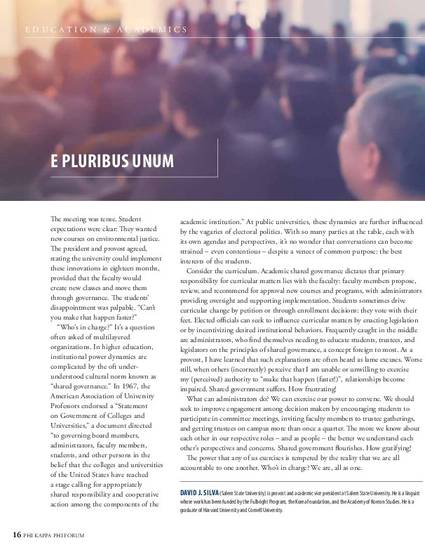
Article
E Pluribus Unum
Phi Kappa Phi Forum
(2018)
Abstract
The meeting was tense. Student expectations were clear: They wanted new courses on environmental justice. The president and provost agreed, stating the university could implement these innovations in eighteen months, provided that the faculty would create new classes and move them through governance. The students’ disappointment was palpable. “Can’t you make that happen faster?”
“Who’s in charge?” It’s a question often asked of multilayered organizations. In higher education, institutional power dynamics are complicated by the oft under- understood cultural norm known as “shared governance.” In 1967, the American Association of University Professors endorsed a “Statement on Government of Colleges and Universities,” a document directed “to governing board members, administrators, faculty members, students, and other persons in the belief that the colleges and universities of the United States have reached a stage calling for appropriately shared responsibility and cooperative action among the components of the academic institution.” At public universities, these dynamics are further influenced by the vagaries of electoral politics. With so many parties at the table, each with its own agendas and perspectives, it’s no wonder that conversations can become strained – even contentious – despite a veneer of common purpose: the best interests of the students.
Consider the curriculum. Academic shared governance dictates that primary responsibility for curricular matters lies with the faculty: faculty members propose, review, and recommend for approval new courses and programs, with administrators providing oversight and supporting implementation. Students sometimes drive curricular change by petition or through enrollment decisions: they vote with their feet. Elected officials can seek to influence curricular matters by enacting legislation or by incentivizing desired institutional behaviors. Frequently caught in the middle are administrators, who find themselves needing to educate students, trustees, and legislators on the principles of shared governance, a concept foreign to most. As a provost, I have learned that such explanations are often heard as lame excuses. Worse still, when others (incorrectly) perceive that I am unable or unwilling to exercise my (perceived) authority to “make that happen (faster!)”, relationships become impaired. Shared government suffers. How frustrating!
What can administrators do? We can exercise our power to convene. We should seek to improve engagement among decision makers by encouraging students to participate in committee meetings, inviting faculty members to trustee gatherings, and getting trustees on campus more than once a quarter. The more we know about each other in our respective roles – and as people – the better we understand each other’s perspectives and concerns. Shared government flourishes. How gratifying!
The power that any of us exercises is tempered by the reality that we are all accountable to one another. Who’s in charge? We are, all as one.
Disciplines
Publication Date
Summer 2018
Citation Information
David Silva. "E Pluribus Unum" Phi Kappa Phi Forum (2018) p. 16 - 16 Available at: http://works.bepress.com/david-silva/33/
